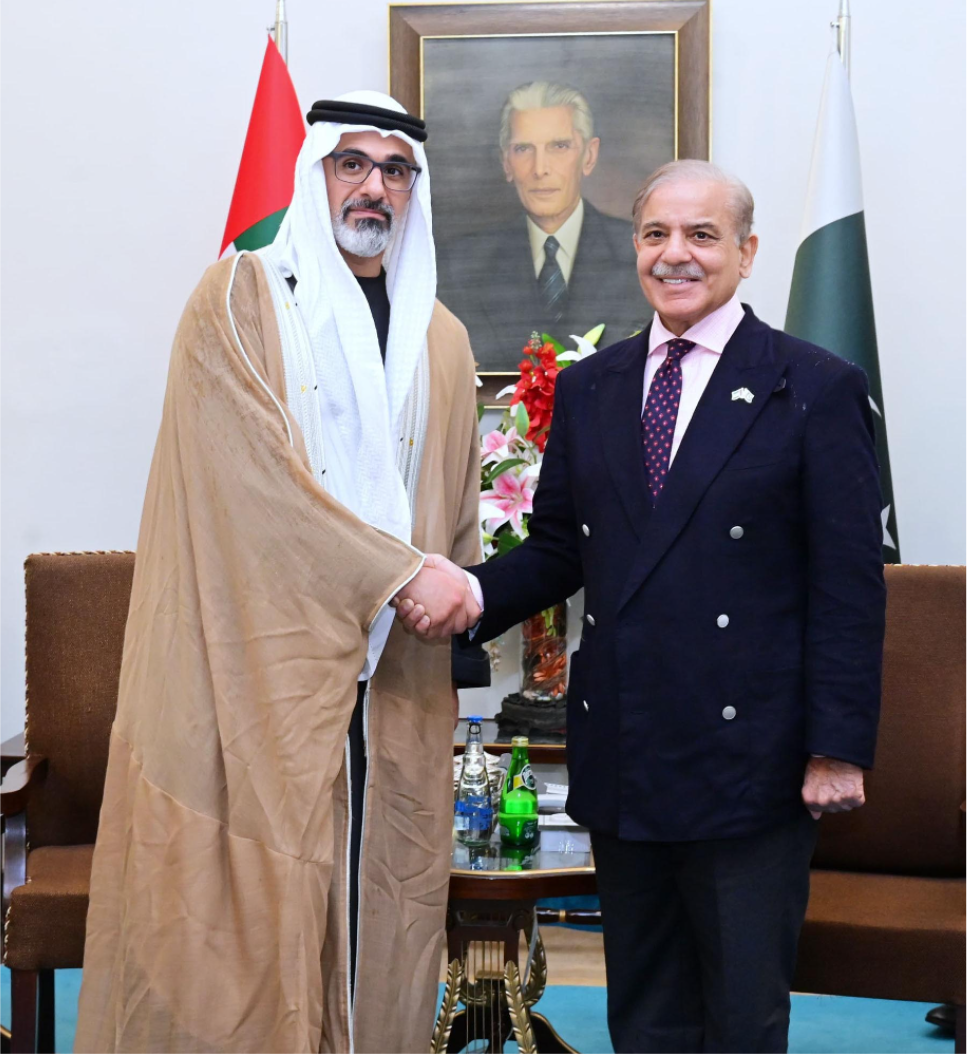26
By: Ahsan Ansari
Prime Minister Muhammad Shehbaz Sharif undertook a one-day official visit to the United Arab Emirates (UAE) on June 12, 2025. This was his second visit to the UAE in the same year; he had previously visited in February. The visit reflected the close and brotherly relations between Pakistan and the UAE, built on mutual trust, strategic alignment, and cooperation across various sectors. It came at a time when Pakistan is actively working to strengthen its diplomatic ties in the region and promote economic partnerships. The visit took place at the special invitation of UAE President Sheikh Mohamed bin Zayed Al Nahyan, highlighting the importance of the relationship between the two nations.
At Abu Dhabi’s Al Bateen Airport, Prime Minister Shehbaz Sharif and his high-level delegation received a warm welcome. UAE’s National Security Advisor Sheikh Tahnoun bin Zayed Al Nahyan and other senior officials welcomed them. Pakistan’s Ambassador Faisal Niaz Tirmizi was also present on the occasion. The Prime Minister’s delegation included Deputy Prime Minister and Foreign Minister Senator Ishaq Dar, Interior Minister Mohsin Naqvi, Information Minister Attaullah Tarar, Field Marshal General Syed Asim Munir, and Special Assistant to the Prime Minister Tariq Fatemi. The composition of the delegation made it clear that the visit focused on security, diplomacy, and economic matters.
The most significant event of the visit was the meeting between Prime Minister Shehbaz Sharif and UAE President Sheikh Mohamed bin Zayed Al Nahyan. During the meeting, the two leaders discussed ways to deepen bilateral cooperation, with particular emphasis on economic collaboration. They reviewed the progress on agreements worth over $3 billion signed in February, related to infrastructure, energy, and investment. Both sides also explored new investment opportunities, especially in light of Pakistan’s recent economic improvement, including record remittances and the stock market reaching 124,000 points.
Important discussions were also held on strategic and regional security matters. The Prime Minister expressed gratitude for the UAE’s positive role in mediation during the recent Pakistan-India tensions. Both countries stressed the importance of stability in the region, including in Afghanistan and the Middle East. They expressed deep concern over the ongoing humanitarian crisis in Gaza and agreed on the need for further steps in support of the Palestinian people. The welfare of Pakistani expatriates also featured on the agenda. In May 2025 alone, Pakistan received $3.7 billion in remittances from the UAE—an essential source for the country’s economy.
In addition to bilateral matters, global issues were also discussed, such as climate change and reforms in the United Nations. This dialogue continued the momentum from the Prime Minister’s participation in the Glacier Conference held in Tajikistan, where he supported global actions against climate change. Cooperation in defense and counterterrorism was also discussed, as indicated by the presence of Army Chief General Asim Munir.
This visit holds several important aspects and further solidified the UAE’s position as Pakistan’s third-largest trading partner and financial supporter. In the past, the UAE deposited funds in Pakistan’s central bank, which proved helpful during negotiations with the IMF. Both countries reaffirmed their commitment to a strategic partnership based on mutual interests. They agreed to expedite planned projects and maintain close coordination through joint working groups.
The visit holds broader significance in Pakistan’s foreign policy. It came after recent visits to Saudi Arabia, Turkey, Iran, and Azerbaijan, reflecting a systematic effort to strengthen regional ties amid prevailing geopolitical challenges. The UAE’s economic diversification strategy, known as the “Projects of the 50,” aligns with Pakistan’s need for foreign investment—particularly in technology, logistics, and renewable energy sectors. The two nations also demonstrated solidarity on the issue of Palestinian human rights, exemplifying unity among Muslim countries.
Prime Minister Shehbaz Sharif’s visit to the UAE in June 2025 is a successful example of practical diplomacy. It transformed long-standing relations into tangible economic and strategic benefits. It is now the responsibility of both nations to effectively implement the agreed projects and maintain high-level engagement. As Pakistan strives to stabilize and grow its economy, such strong partnerships will play a vital role in its journey forward.




